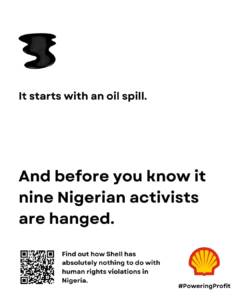It started with a poster about the Ogoni 9. Shell demanded – with a summons letter – that we remove this poster from the internet.
Instead of removing the poster, we upgraded the footer and created six additional posters that focus on Shell’s disastrous role in the circumstances surrounding the execution of these activists, the pollution of Ogoniland and the human rights violations in Nigeria.
Our poster was a reaction to a new shameless marketing campaign that Shell launched in the Netherlands. In this campaign, Shell presents itself as the driver of the energy transition with catchy phrases like “It starts with one wind turbine. And before you know it, you’re building four offshore wind farms.”
To spotlight the reality of Shell’s work, Fossielvrij NL (Fossil Free Netherlands) created a counter campaign. Using the same style and phrasing as the original posters we showed how Shell obstructed climate policy and how people have been suffering from Shell’s activities in for instance Groningen, Indonesia and Nigeria. One of the posters mentioned the Ogoni 9.
Shell claimed that this particular poster was misleading, saying that we accused Shell of murder. We obviously never said Shell single-handedly killed the nine activists in Nigeria. We did say however – and we are repeating this statement again today – that Shell played a harmful role in the circumstances surrounding the executions and human rights violations in Nigeria. Our new poster series puts a spotlight on this.
It is outrageous that oil giant Shell is trying to silence a small NGO, while at the same time refusing to take accountability for its role in human rights violations in Nigeria. It is heartbreaking that the people of Nigeria are left in polluted land, while Shell took off with the profits. We are not going to be silent about this. Because as Ken Saro-Wiwa (writer, poet and one of the Ogoni 9) said: “Silence would be treason.”
Read what happened after Shell discovered oil in Ogoniland.
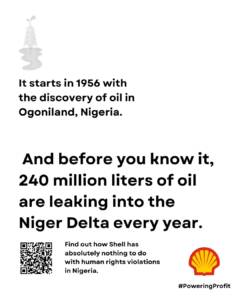
It starts in 1956 with the discovery of oil in Ogoniland, Nigeria. And before you know it, 240 million liters of oil are leaking into the Niger Delta every year.
After oil was found in 1956, Shell began extracting oil in Ogoniland in the Niger Delta (Nigeria) from 1958. Soon, oil spills occur, seriously contaminating the land. Various media report that nearly 3,000 oil spills occurred between 1976 and 1991, leaking more than 2 million barrels of oil.[1] According to Friends of the Earth Netherlands, 240 million liters of oil leak into the delta every year.[2]
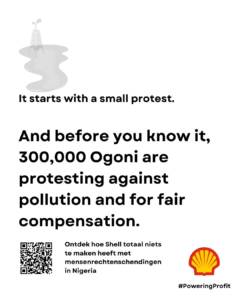
It starts with a small protest. And before you know it, 300,000 Ogoni are protesting against pollution and for fair compensation.
Because of all the oil spills, the land became so badly polluted [3]that the Ogoni could no longer safely live there.
In 1990, writer and activist Ken Saro-Wiwa and other Ogoni leaders founded the Movement for the Survival of the Ogoni People (MOSOP). This organization wants an end to Ogoni exploitation and pollution of the land. In 1992 and 1993, MOSOP succeeded in organizing large, peaceful protests.[4] In the largest march 300,000 people, out of a total population of 500,000, participated.[5]
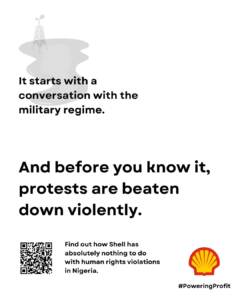
It starts with a conversation with the military regime. And before you know it, protests are beaten down violently.
Shell was a very powerful and influential party in Nigeria that maintained close ties with the military regime. Several media outlets and NGOs wrote that Shell asked the military regime for support because of the protests in Ogoniland.[6] In the early 1990s, the regime cracked down on the protests with heavy-handed and excessive force. [7] Among the facts of the interim judgment [8] in the case of four of the widows of the Ogoni 9 against Shell, the following is stated:
2.12. In October 1990, residents of Umuechem, a village just outside Ogoniland, protested against inadequate electricity and water facilities in Umuechem and the lack of reasonable compensation for the expropriation and exploitation of their land. After the divisional manager east of SPDC, [H] ( [H] ), asked the Nigerian Commissioner of Police for “security protection (preferably by Mobile Police Force)” on October 29, 1990, the Mobile Police Force (MOPOL) acted against the protesters in Umuechem on October 31, 1990. This left dozens dead and many wounded. 495 houses were set on fire.
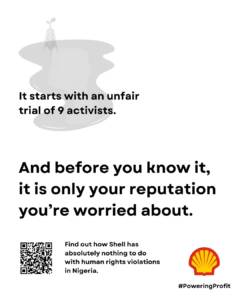
It starts with an unfair trial of 9 activists. And before you know it, it is only your reputation you’re worried about.
In 1995, two groups of activists including Ken Saro-Wiwa, were arrested and charged with the murder of four Ogoni leaders. A special military tribunal ruled in the case that nine of the activists were guilty and would be hanged. There was huge international outcry over the case, which is seen as a sham trial.[9]
The Hague District Court makes several references to Shell’s fear of reputational damage in the established facts of the interim ruling in the trial of four of the widows of the hanged men against Shell. For example:
4.119. On July 22, 1995, [L] spoke with [G] . The day before, he had spoken to the British ambassador about the upcoming meeting with [G] . He heard at that time from the British ambassador that the second group of lawyers in the tribunal had stopped because they felt they could not properly perform their duties because the process was determined by the Nigerian military. [L] noted in this regard:
“He seemed to be quite sure that KSW [10] [ [I] , addition of the Court] will be convicted, perhaps to the death penalty, to be commuted later on to life imprisonment. I told him that this would be a very unpleasant outcome for Shell, as the international outrage would certainly involve us. The time between conviction and commutation of the sentence would also be critical to us. There is also the link to the coup plotters: if some of them are shot, then the outside world will, probably justifiably, conclude that KSW may also be executed, and therefore renewed internationalisation of the KSW/Ogoni issue could be triggered off even before that verdict is announced.” [11]
That reputational damage is still a concern for Shell is also evidenced by the summons letter we received. This is an interesting piece (2000) on the Ogoni case and internal developments around Social Corporate Responsibility at Shell.
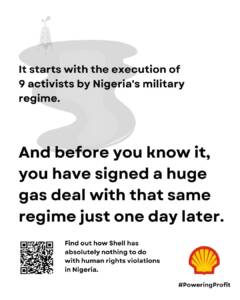
It starts with the execution of 9 activists by Nigeria’s military regime. And before you know it, you have signed a big gas deal with that same regime just one day later.
The facts of the interim judgment in the case of four of the widows of the Ogoni 9 against Shell state the following:
2.38. On November 8, 1995, the Provisional Ruling Council (PRC), chaired by [G], ratified the death sentences. The Ogoni 9 were put to death by hanging on November 10, 1995.
2.39. On November 11, 1995, SPDC and Nigeria reached an agreement on the so-called “NLNG Project.” Nigeria Liquid Natural Gas (NLNG) is a legal entity formed in May 1989 for the purpose of producing liquified natural gas (LNG). Shareholders in NLNG were (and are) NNPC, Shell Gas B.V., Total LNG Nigeria Ltd and Eni S.p.A. The shares in Shell Gas BV were held by Royal Dutch. In 1995, negotiations took place regarding, among other things, the operational activities of NLNG, the establishment of joint venture agreements and the financing of the joint venture by the parties involved. Some time later, in December 1995, the agreement reached on the NLNG project was made public. [12]
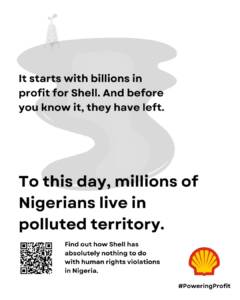
It starts with billions in profit for Shell. And before you know it, they have left. To this day, millions of Nigerians live in polluted territory.
In 2017, UNDP releases a report [13] on the severity of pollution in Ogoniland – the most comprehensive study ever done. The findings are shocking. More than 20 years after Shell ceased oil production in the area, the land is still very seriously polluted, with dire consequences for the people who live there. In fact, a large pipeline still runs through the area.[14] In 2020 and 2021, another 800 oil spills are reported. [15]
Shell seems to want to sell its onshore operations in Nigeria, leaving Nigerians in the oil leaked from its pipelines. [16]
Footnotes:
[1] https://www.aljazeera.com/features/2022/12/21/timeline-oil-spills-in-nigerias-ogoniland; https://www.africanews.com/2021/09/01/nigeria-new-oil-law-fuels-tensions-in-the-niger-delta/
[2] https://milieudefensie.nl/actueel/alles-wat-je-wil-weten-over-de-rechtszaak-tegen-shell-in-nigeria
[3] https://hir.harvard.edu/bathing-our-bodies-in-soot/ ;
https://wedocs.unep.org/handle/20.500.11822/7947;jsessionid=73C2F76DBD64D265CB4B70E4EA98E4A6
[4] https://jp.reuters.com/article/nigeria-shell-timeline-idUKL8N1W80P8; https://unpo.org/article/20716;
[5] https://nvdatabase.swarthmore.edu/content/ogoni-people-struggle-shell-oil-nigeria-1990-1995
[6] https://www.amnesty.org/en/documents/AFR44/7393/2017/en/; chapter 2.3: “Shell solicited the involvement of the armed forces and encouraged human rights abuses in Ogoniland”. ; https://www.nytimes.com/1996/02/13/world/blood-and-oil-a-special-report-after-nigeria-represses-shell-defends-its-record.html
[7] https://www.amnesty.org/en/documents/AFR44/7393/2017/en/ ; 2.12 from court ruling The Hague, 1May 2019: https://uitspraken.rechtspraak.nl/#!/details?id=ECLI:NL:RBDHA:2019:4233
[8] District Court of The Hague, May 1st 2019, https://deeplink.rechtspraak.nl/uitspraak?id=ECLI:NL:RBDHA:2019:6670, paragraph 2.12 (English translation of https://deeplink.rechtspraak.nl/uitspraak?id=ECLI:NL:RBDHA:2019:4233).
[9] http://edition.cnn.com/WORLD/9511/nigeria/11-11/; Human Rights Watch, ‘The Price of Oil, Corporate Responsibility and Human Rights Violations in Nigeria’s Oil Producing Communities’ https://www.hrw.org/reports/1999/nigeria/
[10] KSW = Ken Saro-Wiwa
[11] District Court of The Hague, May 1st 2019, https://deeplink.rechtspraak.nl/uitspraak?id=ECLI:NL:RBDHA:2019:6670, paragraph 4.116, 4.119 (English translation of https://deeplink.rechtspraak.nl/uitspraak?id=ECLI:NL:RBDHA:2019:4233)
[12] District Court of The Hague, May 1st 2019, https://deeplink.rechtspraak.nl/uitspraak?id=ECLI:NL:RBDHA:2019:6670, paragraph 2.38, 2.39 (English translation of https://deeplink.rechtspraak.nl/uitspraak?id=ECLI:NL:RBDHA:2019:4233).
[16] https://www.rtlnieuws.nl/economie/bedrijven/artikel/5246315/shell-nigeria-verkoop-milieu-beleggers

